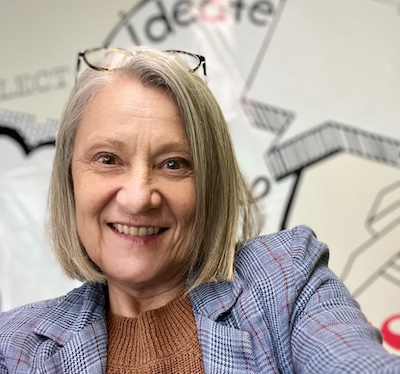
Staff Spotlight Saturday is a Q&A series highlighting individual staff members from various academic programs at Spalding University. This week’s featured member is Deborah Whistler, Director of Design Thinking & Social Innovation, Career Design & Associate Professor of Liberal Arts studies.
What does your role at Spalding entail?
In my role at Spalding, I oversee the Career Design Center, where we provide a holistic, human-centered, and campus-wide integrated approach to career planning for students and alumni. I also teach design thinking and creative problem solving in the Liberal Arts program, and I offer workshops in design thinking for student organizations, departments, and committees.
Why did you decide to work at Spalding? What do you like about Spalding in particular?
I first came to Spalding in 2018 after 18 ½ years of teaching creative thinking, design, and art at another private college. I was drawn to Spalding’s mission: “A diverse community of learners dedicated to meeting the needs of the time.” This resonated with my passion for innovation and social impact. Initially, I helped build an innovation program within the Arts, grounded in design thinking. In 2022, my role shifted with the opening of the Career Design Center, where we empower students and alumni by offering a holistic approach to career planning—one that integrates career exploration throughout the entire college experience.
How do you ensure students feel supported through your role at the Career Design Center?
I use a design thinking approach to work closely with students, listen carefully to their goals, ask guiding questions, and collaborate with them to discover personalized solutions. It’s important to me that students feel empowered to discover what works best for them, rather than feeling pressured to follow a “one-size-fits-all” path.
To make support accessible, we offer flexible options, including in-person and virtual coaching, evening hours, and work-study tutors. We also provide free career coaching to students after graduation, which helps ease the common anxiety many students feel about finding all the answers before they leave school. The Career Design Center serves as a bridge between students’ current academic experiences and their future career opportunities.
What resources or tools do you recommend for students to explore career options and prepare for internships or jobs?
The Career Design Center provides several empowering resources for students and alumni:
- Clifton Strengths Assessment & Coaching: As a certified Clifton Strengths coach, I guide students through discovering their natural leadership strengths. This tool helps students gain a deeper self-awareness, which is essential for both personal and professional development.
- Career Pathway Design: Using Design Thinking, we work together to map out a series of actionable steps that lead students toward their professional goals.
- Interview Stream: A new service launching in the spring, this tool allows students to practice mock interviews and receive feedback to refine their interview skills.
- Mentor Program: We connect students with peers, alumni, and professionals in their field of interest to help them build a supportive network.
What is one skill you hope every student gains from the Career Design Center, and why do you believe it’s important?
Self-empowerment is a critical skill I hope all students gain. It’s about equipping them with the tools to navigate future challenges, understand their value, and communicate that value effectively. This goes beyond just landing a job—it’s about negotiating their worth, advocating for themselves, and becoming leaders in their chosen fields.
How does your role help students connect what they learn in the classroom to real-world challenges and career opportunities?
I help students bridge the gap between their academic experiences and their future careers by guiding them to answer their “why” question—connecting their passions with their purpose. We explore how their education can translate into meaningful career paths, helping them understand the diverse opportunities available within their fields. We also focus on the importance of collaboration by encouraging students to build mentor relationships, network, and follow their curiosity as they prepare for the future.
Why should students pursue a liberal arts degree?
A liberal arts education teaches students how to think critically, solve problems, make informed decisions, and take strategic risks. These skills are invaluable in today’s rapidly changing world. A liberal arts degree fosters intellectual flexibility and creativity, which are essential for success in any career. Today, two-thirds of employers look more at the successful skills that graduates have mastered rather than the major listed on their diploma when interviewing for entry-level college graduate positions.
What’s an interesting thing you keep in your office?
I have a white rabbit desk lamp in my office, inspired by Alice in Wonderland. I’ve always been fascinated by the white rabbit, who represents curiosity and the courage to venture into the unknown. For me, following the white rabbit symbolizes the pursuit of curiosity, resourcefulness, and innovation in the face of challenges. It reminds me that lifelong learning and staying curious are as essential as the air we breathe.